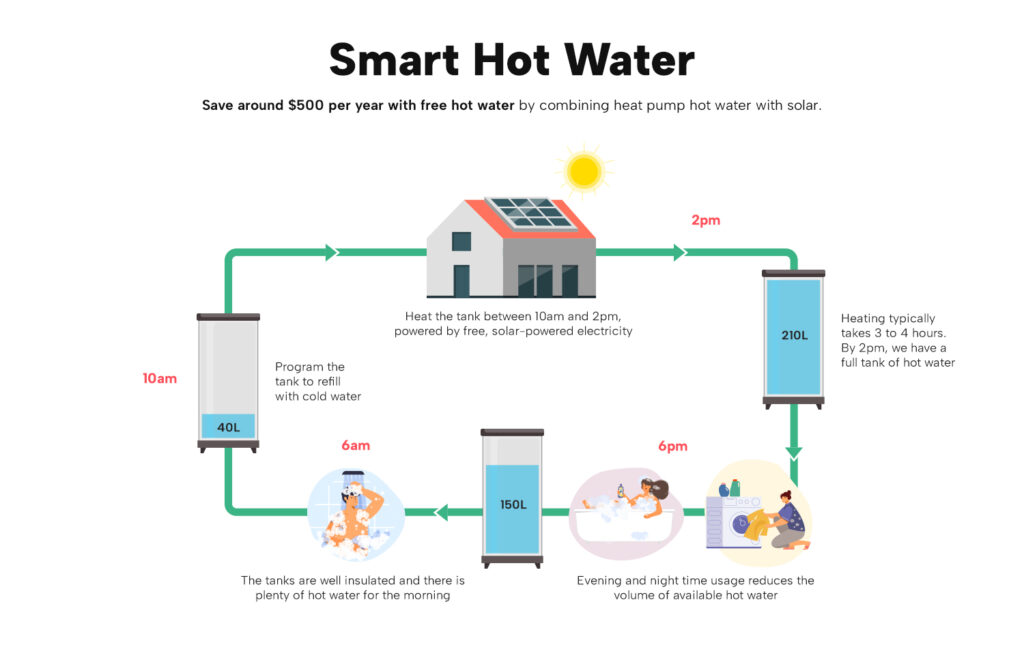Key takeaways
- Combining solar with your heat pump hot water unit can effectively give you free hot water
- Set a timer to run the unit between say 9am and 3pm - your solar will power the unit for free hot water
The average home spends around 20-25% of its energy usage, or around $500 per year, on hot water. Below we explain how we can combine heat pump hot water with solar to effectively provide free hot water to the home.
Current Hot Water Services
The vast majority of hot water services in Victoria are gas-powered: either gas storage or gas instant. The general rule is whereas electricity is smart, gas is dumb. Looking at how a gas storage system operates illustrates this point. Gas storage hot water services continually heat water in a tank. When hot water is used in the home, the tank is drained and then refilled with hot water. If someone has a late shower at say 11pm, the tank will refill and reheat, even though there will be no need for hot water until the morning.
Instant gas hot water services are smarter as they only operate on consumption. As hot water is drawn from the home, the units fire up, burning gas to heat water which is then delivered to the relevant tap. While these systems are certainly more efficient than gas storage units, and while they are somewhat smart as they only use energy on consumption, we suggest they are only smart because they require an electrical connection which is used as a spark to ignite the flame which burns the gas. We also argue they are not instant, as it can take a long time for the hot water to arrive, while cold water is wasted down a drain.
Smart Hot Water

Smart hot water is a term I have coined to describe the combination of heat pump hot water units with solar panels. It works as follows:
- Let's assume we start the day at 10am with minimal water in a 210L tank
- We program the heat pump hot water unit to refill with cold water
- The heat pump hot water unit kicks into operation, heating the tank of water. This process varies for each unit, but typically takes 3 to 4 hours.
- The hot water unit operates between 10am and 2pm, powered by free, solar-generated electricity
- At 2pm, we have a full tank of hot water
- Now here's the key - we need to size the tank appropriately. For smart hot water to work, we need to ensure we have a big enough tank to last us until 10am the next day.
- We use say around 60L in the evening washing dishes and allowing for one occupant to have a shower (approx 50L)
- We have 150L left in the morning. The tanks are well insulated so the water temperature only drops by one or two degrees overnight.
- We use another 110L for two showers and morning activities before returning to 10am, with 40L left and we start the process again.
We generally allow 50L of hot water used per person per day. We need to take into account other factors like baths, teenagers that love a 10 minute shower and whether appliances like washing machines and dishwashers draw hot water or heat the water themselves (in which case, they should be run during the day too!). We should also take into account frequency of visitors - are we likely to have visitors that stay with us from time-to-time and will draw extra hot water?
Now is probably the right time to admit that the hot water won't exactly be free, for two reasons.
The first is the upfront cost of both the heat pump hot water unit and solar. The good news is these units independently will pay for themselves. The payback period on solar is now around 5 years. If a heat pump hot water unit is replacing a failed gas unit, there is no upfront cost as the unit needs to be installed anyway (the same could be said for an old unit that is approaching expiry).
The second reason is the sun does not always shine. Again, there is good news - heat pump hot water units draw very little electricity. Even if solar production is low and we need extra from the grid, the cost will be minimal.
Timers
Another reason to set a timer is to take advantage of higher air temperatures. As we outline in How does heat pump hot water work, the units suck heat out of the air, amplify it and pump it into the water. Units will operate more efficiently if there is more heat in the air, so better to run them in the middle of the day rather than the middle of the night.
Summary
Heat pump hot water is the most efficient way to heat water for your home. It is far less expensive to run than gas or other electric hot water options, with these efficiency gains leading to significant savings and reduced energy bills. And the story gets even better for those with solar on their roofs, giving homeowners the ability to heat their water with free electricity.




